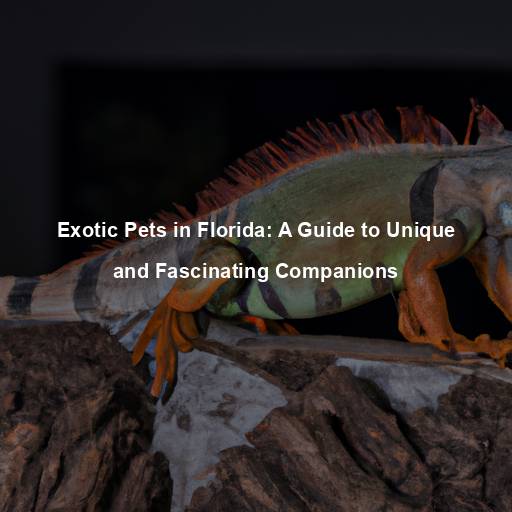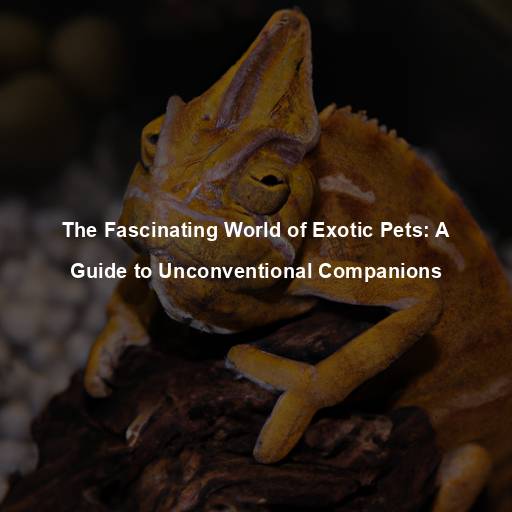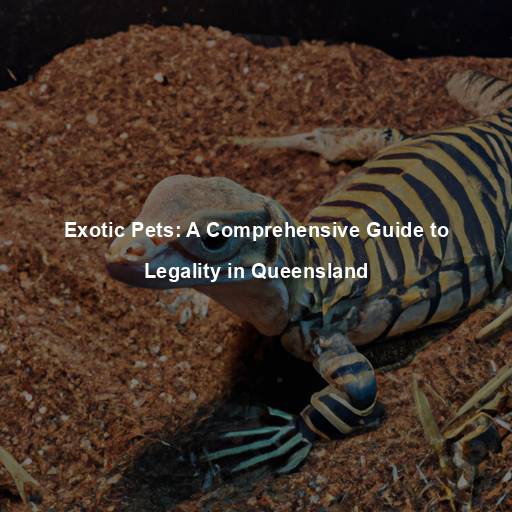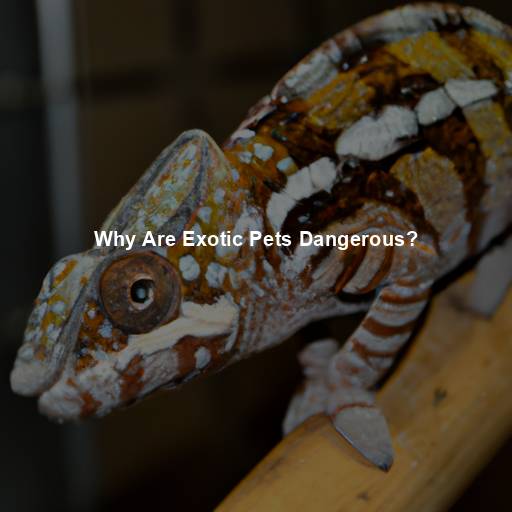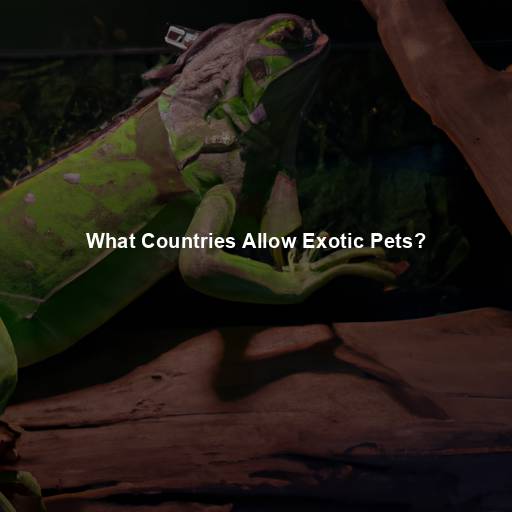Why Exotic Pets Can Be Dangerous: A Closer Look at the Risks and Consequences
Last Updated on October 31, 2023 by Evan
Contents [hide]
- 1 The Appeal of Exotic Pets: Unveiling the Allure
- 2 The Dark Side of Exotic Pet Ownership: Unveiling the Risks
- 3 A Call for Responsible Pet Ownership: Navigating the Ethical Dilemma
- 4 The Impact on Wildlife Conservation: A Delicate Balance
- 5 Responsible Alternatives: Channeling the Passion for Exotic Pets
- 6 FAQs: Why Exotic Pets Are Dangerous
- 6.1 What are exotic pets?
- 6.2 Why can exotic pets be dangerous?
- 6.3 Aren’t exotic pets just as safe as domesticated pets?
- 6.4 What are some specific risks associated with owning exotic pets?
- 6.5 Are there legal concerns with owning exotic pets?
- 6.6 Can exotic pets be harmful to the environment?
- 6.7 What alternatives are there to owning exotic pets?
The Appeal of Exotic Pets: Unveiling the Allure
The undeniable allure of owning an exotic pet has captivated the hearts of many, with a desire for something truly extraordinary and out of the ordinary. From the regal magnificence of a Bengal tiger to the endearing quirkiness of a capuchin monkey, the allure is undeniably tempting. However, it is crucial to lift the veil and acknowledge the potential dangers and risks that come hand in hand with the ownership of these extraordinary creatures. In this insightful piece, we will carefully explore the perplexing reasons why exotic pets can pose a genuine threat, not only to themselves but also to their human counterparts.
The Dark Side of Exotic Pet Ownership: Unveiling the Risks
Ecological Disruption: A Threat to Biodiversity
One of the most significant concerns associated with the exotic pet trade is the potential for ecological disruption. The introduction of non-native species into new environments can have devastating effects on local ecosystems. Exotic pets, if released or escaped into the wild, can become invasive species, outcompeting native wildlife for resources and disrupting delicate ecological balances. This disruption can lead to the decline or even extinction of indigenous species, posing a severe threat to biodiversity.
Zoonotic Diseases: A Silent Peril
Owning exotic pets brings forth an unsettling predicament that demands our attention – the looming threat of zoonotic diseases. These animals, with their exotic allure, frequently harbor pathogens that can make their way into our human realm, with potentially devastating consequences. The vulnerability of our immune systems, unaccustomed to these infectious agents, magnifies the danger they pose. From the familiar Salmonella to the less-known Monkeypox, the array of zoonotic diseases linked to exotic pets is astonishingly vast.
Welfare Issues: A Hidden Toll
The fascinating world of exotic pets has long captivated the imaginations of animal enthusiasts. However, beneath the enchanting allure lies a darker reality that deserves our attention. Many of these captivating creatures, rather than being ethically bred, are ripped away from their natural habitats, tangled in the insidious web of illegal wildlife trade. The consequences of this heart-wrenching process are dire, as it inflicts cruelty upon these helpless beings while haphazardly dismantling their fragile ecosystems.
Public Safety: A Growing Concern
Exotic pets, by their very nature, possess a wild instinct that cannot be fully extinguished through domestication. This innate behavior can present serious safety risks, both to their owners and to the general public. Even seemingly docile animals can exhibit unpredictable behavior, leading to incidents that result in injuries or fatalities. From venomous snakes to big cats, the potential for harm is always present.
Legal Frameworks: A Step Towards Regulation
It’s no secret that the world of exotic pets can be a wild and unpredictable one. As society evolves, so do our perceptions of what is ethically and morally acceptable when it comes to keeping these unique creatures as companions. In response to growing concerns, authorities around the globe have been taking action by tightening the reins on exotic pet ownership. The ultimate goal?
Education and Awareness: The Key to Prevention
Educating the masses and igniting an awareness revolution about the perils and pitfalls of keeping exotic pets deserves the spotlight. Armed with knowledge on the ecological intricacies, well-being concerns, and health hazards, folks can finally grasp the weighty consequences their choices bear upon wildlife and the planet. Championing conscientious pet guardianship through spirited information drives, community engagement, and readily available resources now holds the key to quelling the clamor for exotic creatures and taming the looming risks.
Support for Sanctuaries and Rehabilitation Centers: A Safe Haven
As pet owners, we often find ourselves facing unexpected challenges when it comes to caring for our beloved exotic companions. However, for those whose circumstances prevent them from providing the necessary attention and care, the importance of supporting sanctuaries and rehabilitation centers cannot be overstated. These remarkable institutions offer a sanctuary for animals that have endured mistreatment, abandonment, or even been rescued from the clutches of illegal trade. By offering financial assistance, donating resources, or lending a helping hand as a volunteer, individuals can make a tangible difference in the lives of these majestic beings, while simultaneously reducing the strain on these vital organizations.
The Influence of Pop Culture and Social Media
Pop culture and social media play a significant role in fueling the desire for exotic pets. Movies, television shows, and viral videos often depict these animals in a glamorous and awe-inspiring light, creating a sense of fascination and desirability. The captivating images and stories shared on social media platforms further perpetuate the idea that owning an exotic pet is both trendy and prestigious. However, it is crucial to recognize that these depictions often portray an unrealistic and incomplete representation of the responsibilities and risks involved.
Economic Factors and Profit Motives
The exotic pet trade is driven by economic factors and profit motives. For many individuals involved in this industry, the primary goal is financial gain rather than the welfare of the animals. The rarity and novelty of certain exotic species make them highly sought after, leading to inflated prices and a lucrative market. However, the pursuit of profit often comes at the expense of the animals’ well-being, as they are subjected to cramped and unsuitable living conditions, inadequate care, and transportation-related stress.
Legal Loopholes and Illicit Activities
The global landscape of the exotic pet trade is a tapestry of perplexity and inconsistency. As our journey takes us across borders, we encounter a patchwork of legal frameworks that both intrigue and bewilder. While certain nations stand resolute with stringent regulations to protect these enchanting creatures, others present us with the perplexing loopholes that dance on the edge of legality. These shimmering cracks in the system offer a fertile ground for a clandestine underworld of smuggling, endangered species quietly slipping through the cracks, and unlicensed breeding facilities lurking behind veils of deception.
The Impact on Wildlife Conservation: A Delicate Balance
The insatiable craving for exotic pets has become a perplexing obstacle to global wildlife conservation endeavors. From the moment these magnificent creatures are uprooted from their natural habitats, the intertwined tapestry of ecosystems unravels with a burst of chaos. As vulnerable populations diminish, the intricate web of life is marred by the loss of biodiversity, igniting a domino effect that threatens the stability of entire ecosystems, teetering on the precipice of an irreparable collapse. It is in these dire circumstances that the urgent need for action is magnified, for the preservation of our planet‘s delicate balance is hanging in a perilous state of limbo.
Habitat Destruction and Species Decline
The exploitative cycle of capturing and trading exotic animals has a cascading impact on our fragile ecosystems. The insatiable greed of poachers and traffickers forces them to invade and ravage natural habitats, leaving behind a trail of devastation in their wake. This includes the alarming destruction of precious forests, the contamination of our pristine environments with pollution, and the irreversible degradation of land. Sadly, these activities not only imperil numerous species but also jeopardize their very existence, as the relentless demand for certain animals leads to their reckless overexploitation and imminent extinction.
Conservation Efforts and Sustainable Alternatives
Efforts to combat the negative impact of the exotic pet trade on wildlife conservation have been underway for years. Conservation organizations and governmental bodies work tirelessly to enforce regulations, raise awareness, and support sustainable alternatives. Initiatives that focus on habitat protection, breeding programs, and community engagement are key in promoting the conservation of endangered species and their habitats. By supporting these efforts and advocating for responsible pet ownership, individuals can contribute to the preservation of our planet‘s rich biodiversity.
Responsible Alternatives: Channeling the Passion for Exotic Pets
If you find yourself captivated by the mystique of owning an unusual animal companion but want to steer clear of the potential risks and moral quandaries, fear not. There exist alternative pathways that allow you to indulge your fascination while making a meaningful impact on the world of fauna.
Volunteerism and Conservation Tourism
Immerse yourself in the awe-inspiring world of wildlife by venturing into the remarkable realm of volunteering. At wildlife sanctuaries, rehabilitation centers, and conservation projects, you unravel the mysterious tales of exotic creatures, wrapped in a cloak of compassion and responsibility. With each encounter, you unlock the secrets of wildlife conservation, embedding yourself in the ethereal fabric of animals’ well-being, while simultaneously empowering local communities hell-bent on safeguarding biodiversity. Step into the wild, where conservation tourism unveils a symphony of unrivaled experiences and nurtures a profound love for exotic species flourishing in their untouched realms, fostering the foundation of eco-friendly and sustainable wildlife appreciation.
Supporting Conservation Organizations
Directly supporting reputable conservation organizations through donations or fundraising initiatives can make a significant impact on the preservation of endangered species and their habitats. These organizations work tirelessly to combat the threats posed by the exotic pet trade and implement long-term solutions for wildlife conservation. By contributing to their efforts, individuals can play a vital role in safeguarding the world’s most vulnerable species.
Ethical Pet Ownership: Choosing Domesticated Breeds
For those seeking a unique and fulfilling companion, choosing a domesticated pet breed that suits their lifestyle and preferences is a responsible alternative to exotic ownership. Domesticated animals have undergone centuries of selective breeding, resulting in breeds that are well-suited for life alongside humans. By adopting from reputable shelters or breeders and providing a loving home to a domesticated pet, individuals can experience the joy and companionship that comes with pet ownership without contributing to the risks associated with exotic pets.
FAQs: Why Exotic Pets Are Dangerous
What are exotic pets?
In the fascinating realm of pet ownership, there exists a captivating category known as exotic pets. These extraordinary creatures defy convention and captivate the hearts of courageous individuals seeking a non-traditional companionship. From the sinuous elegance of reptiles, such as serpents, lizards, and turtles, to the vibrant avian wonders like parrots and macaws, and even the enigmatic mammals, monkeys, hedgehogs, and sugar gliders – these uncommon beings bewilder and bewitch, beckoning us into their beguiling world of unconventional pet parenthood.
Why can exotic pets be dangerous?
Exotic pets can be dangerous for several reasons. First and foremost, many exotic animals have specific dietary, environmental, and social needs that are challenging to meet in a domestic setting. This can lead to health issues or behavioral problems that can pose risks to both the owner and the animal. Additionally, many exotic pets, especially larger species, have specialized natural behaviors that may be difficult to manage or control, potentially resulting in accidents or harm to humans or other animals.
Aren’t exotic pets just as safe as domesticated pets?
No, exotic pets are considered more dangerous than domesticated pets for several reasons. Unlike domesticated animals that have undergone generations of selective breeding for companionship and adaptation to human environments, exotic pets often retain their wild instincts, making them less predictable and potentially more hazardous. Moreover, exotic pets may carry zoonotic diseases, which are infectious diseases that can be transmitted from animals to humans, due to their unique biology and susceptibility to various pathogens.
What are some specific risks associated with owning exotic pets?
Owning exotic pets comes with numerous risks. Some animals, such as large snakes or certain primates, have the physical strength and potential aggressiveness to cause severe harm if they feel threatened or become stressed. Many exotic pets require specialized housing conditions, which can be expensive and complex to maintain. Furthermore, some exotic animals, like certain reptiles, can carry salmonella bacteria without showing any symptoms, posing a health risk to their owners and others who come into contact with them.
Are there legal concerns with owning exotic pets?
Owning exotic pets can be quite the legal jungle, my friend. With laws varying so wildly from place to place, it’s enough to make your head spin. Before taking the plunge into the world of exotic pet ownership, make sure to dig deep and unravel the legal web in your own neck of the woods. Don’t let perplexing regulations rain on your parade!
Can exotic pets be harmful to the environment?
The allure of exotic pets is undeniable, but the consequences of their release into the wild are often shrouded in uncertainty and perplexity. When the adoration fades and their owners can no longer bear the weight of their responsibility, these once beloved creatures are sometimes set free to venture into unfamiliar natural habitats. Their mere presence, often as non-indigenous inhabitants, can disrupt the delicate balance of local ecosystems, preying on indigenous species and potentially unraveling the web of life that sustains the environment we hold dear. The resulting damage, in all its burstiness, can bear irreversible consequences for the fragile beauty of our world.
What alternatives are there to owning exotic pets?
Explore the fascinating realm of animal companionship without stepping into the treacherous territory of exotic pet ownership. Embrace the adventure of volunteering at an animal shelter or wildlife rehabilitation center, where you can immerse yourself in the care of diverse creatures under the compassionate guidance of seasoned experts. For a dose of educational excitement, venture into the immersive realms of nature reserves, zoos, or interactive educational centers, where you can witness and learn from exotic species in a controlled and enriching setting.
When it comes to welcoming a furry friend into your life, let’s not forget the paramount importance of animal welfare. It’s time to embark on a journey that requires making thoughtful choices that harmonize with both your capabilities and the unique needs of your prospective pet. So, gear up for a perplexing yet rewarding adventure, where you’ll navigate the labyrinth of responsible pet ownership while ensuring the utmost care for our beloved creatures. Let’s dive in!


